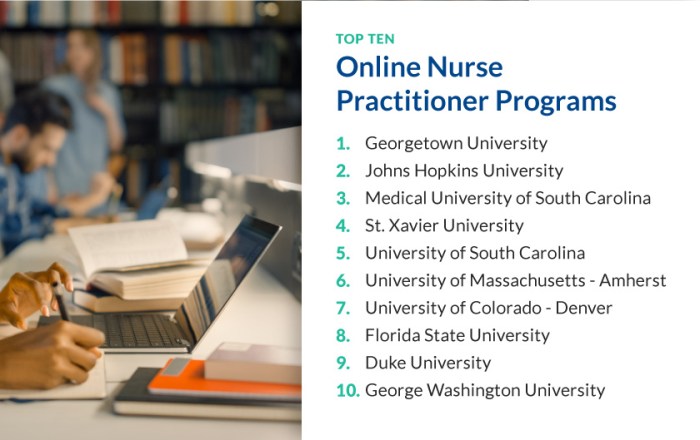Accredited online nurse practitioner programs are rapidly gaining popularity, offering a flexible and convenient path to a rewarding career in advanced nursing practice. The demand for qualified nurse practitioners is skyrocketing, driven by factors such as an aging population, an emphasis on preventative care, and a shortage of primary care physicians.
Online programs provide a valuable opportunity for experienced registered nurses to enhance their skills and knowledge, expand their career horizons, and contribute to the well-being of their communities.
These programs offer a comprehensive curriculum covering advanced nursing concepts, clinical practice, and evidence-based healthcare. They are designed to equip graduates with the skills and knowledge needed to diagnose and treat a wide range of conditions, manage chronic illnesses, and provide comprehensive care to diverse patient populations.
From family nurse practitioners to adult-gerontology nurse practitioners, the field offers a variety of specializations, allowing individuals to tailor their education to their interests and career goals.
Introduction to Online Nurse Practitioner Programs

The demand for nurse practitioners is rapidly increasing across the United States, driven by factors such as an aging population, a growing emphasis on primary care, and a shortage of physicians. This growth presents a significant opportunity for registered nurses (RNs) seeking to advance their careers and make a meaningful impact on patient care.
Online nurse practitioner (NP) programs provide a flexible and convenient pathway for RNs to earn their Master of Science in Nursing (MSN) and become qualified to provide advanced nursing care.
If you’re in the UK and looking to further your education online, you’re in luck! There are plenty of excellent programs available, from business to healthcare. You can learn more about the top programs by checking out our guide to online education masters uk.
Advantages of Online Nurse Practitioner Programs
Online NP programs offer several advantages over traditional on-campus programs, making them an attractive option for working nurses.
- Flexibility and Convenience:Online programs allow students to study at their own pace and on their own schedule, accommodating busy work schedules and family commitments. This flexibility is especially valuable for working nurses who may not be able to attend traditional on-campus classes.
- Affordability:Online programs often have lower tuition costs than traditional programs, as they eliminate the need for expensive on-campus facilities and resources. Additionally, online programs may offer scholarships and financial aid options to help students cover tuition and other expenses.
- Accessibility:Online programs remove geographical barriers, allowing students to access high-quality education from anywhere in the world. This is particularly beneficial for nurses who live in rural or underserved areas, where access to traditional NP programs may be limited.
Types of Nurse Practitioner Specialties
Nurse practitioners specialize in providing comprehensive and patient-centered care in a variety of settings. The following are some of the most common NP specialties:
- Adult-Gerontology Primary Care (AGPCNP):AGPCNPs provide primary care to adults and older adults, managing chronic conditions, promoting health and wellness, and coordinating care across different healthcare settings.
- Family Nurse Practitioner (FNP):FNPs provide comprehensive primary care to individuals and families across the lifespan, from newborns to older adults. They diagnose and treat illnesses, manage chronic conditions, and promote health and wellness.
- Acute Care Nurse Practitioner (ACNP):ACNPs provide advanced care to patients in acute care settings, such as hospitals and intensive care units. They manage complex medical conditions, provide critical care, and collaborate with other healthcare professionals.
- Pediatric Nurse Practitioner (PNP):PNPs specialize in the care of infants, children, and adolescents. They diagnose and treat illnesses, manage chronic conditions, and provide preventive care.
- Psychiatric Mental Health Nurse Practitioner (PMHNP):PMHNPs provide mental health care to individuals and families, diagnosing and treating mental health conditions, managing medications, and providing psychotherapy.
Accreditation and Its Importance
Accreditation plays a crucial role in ensuring the quality and credibility of online nurse practitioner programs. It serves as a mark of assurance for prospective students, employers, and the healthcare community that a program meets rigorous standards and prepares graduates to practice effectively.
Accreditation Bodies and Their Role
Accreditation bodies are independent organizations responsible for evaluating and accrediting educational programs. They establish comprehensive standards that programs must meet to demonstrate their quality and effectiveness. These standards cover various aspects, including curriculum, faculty qualifications, clinical experiences, and student support services.
By adhering to these standards, accredited programs demonstrate their commitment to providing a high-quality education that prepares graduates for success in their chosen profession.
Key Accreditation Agencies for Nurse Practitioner Programs, Accredited online nurse practitioner programs
Several reputable accreditation agencies specialize in accrediting nurse practitioner programs. These agencies play a vital role in ensuring that programs meet the highest standards of excellence.
- Accreditation Commission for Education in Nursing (ACEN): ACEN is a national accreditation agency recognized by the U.S. Department of Education. It accredits baccalaureate and graduate nursing programs, including those offering nurse practitioner specializations.
- Commission on Collegiate Nursing Education (CCNE): CCNE is another national accreditation agency that accredits baccalaureate and graduate nursing programs. It offers accreditation for various nurse practitioner specializations, ensuring that programs meet its rigorous standards.
- American Nurses Credentialing Center (ANCC): ANCC is a subsidiary of the American Nurses Association. While not an accreditation agency for programs, ANCC offers certification for nurse practitioners. This certification process ensures that nurse practitioners have met specific competency requirements and are qualified to practice in their specialty.
Looking to advance your career in psychology? There are many top-rated online programs available, and you can find the best fit for your needs by checking out our list of best online colleges for masters in psychology. From clinical psychology to industrial-organizational psychology, there’s a program out there for every area of interest.
Curriculum and Coursework

An accredited online nurse practitioner program provides a comprehensive curriculum that prepares students to become highly skilled and knowledgeable healthcare providers. The program’s coursework is designed to meet the rigorous standards set by the American Nurses Credentialing Center (ANCC) and other national accrediting bodies.
Typical Curriculum Structure
The curriculum of an online nurse practitioner program typically follows a structured format that includes core courses, elective options, and clinical rotations. This comprehensive approach ensures that students develop a strong foundation in nursing science, advanced practice nursing, and clinical decision-making.
| Course Category | Course Examples |
|---|---|
| Core Courses |
|
| Elective Options |
|
| Clinical Rotations |
|
Clinical Experience Requirements
Clinical experience is an integral part of any nurse practitioner program, including online programs. Students are required to complete a specific number of clinical hours in a variety of settings to gain practical experience and apply their theoretical knowledge.
Online programs facilitate clinical rotations through partnerships with healthcare facilities and preceptors located across the country. Students may participate in clinical rotations in their local area or travel to other locations to gain diverse experiences.
Clinical experiences are supervised by experienced nurse practitioners who provide guidance and mentorship. Students are expected to demonstrate clinical competence in areas such as:
- Patient assessment and history taking
- Physical examination and diagnostic testing
- Treatment planning and medication management
- Patient education and counseling
- Collaboration with other healthcare professionals
Conclusion: Accredited Online Nurse Practitioner Programs
Earning an accredited online nurse practitioner degree is a significant investment in your professional development and a testament to your commitment to providing high-quality patient care. With the increasing demand for nurse practitioners and the flexibility of online learning, this pathway offers a compelling opportunity to advance your career and make a meaningful impact on the lives of others.
By carefully researching and selecting an accredited program that aligns with your goals, you can embark on a fulfilling journey toward a rewarding career as a nurse practitioner.
